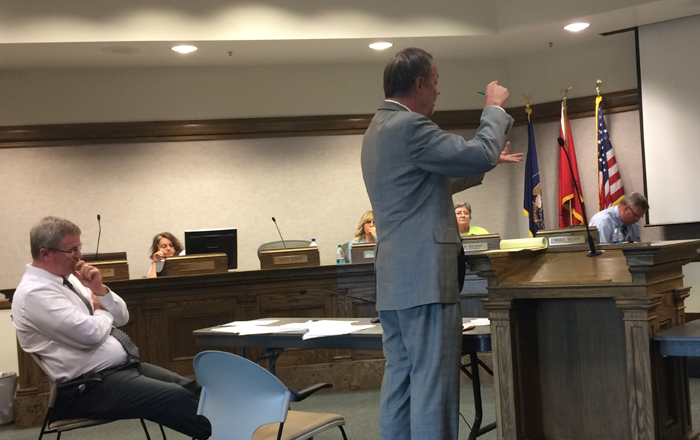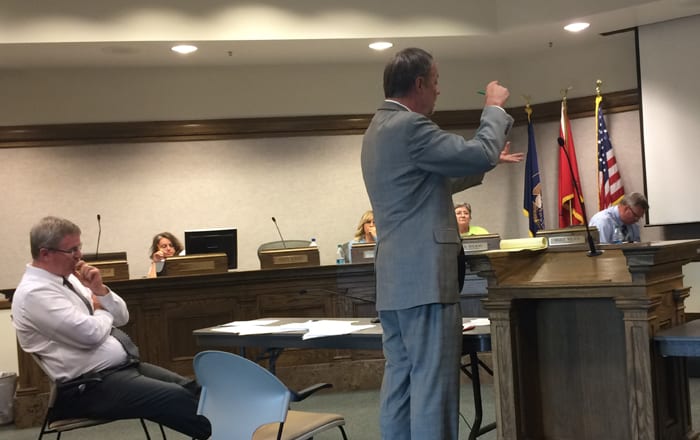 |
| Scott Burns addresses the Iron County Career Service Committee |
Written by Tracie Sullivan
The decision as to whether the Iron County Commissioners wrongfully terminated former Iron County Sheriff Deputy Lt. Jody Edwards will be made within the next two weeks by the County’s Career Service Committee, a three-member committee appointed by the commissioners and comprised of Sandra Benson, who serves as the chair, Dale Orton and Natasha Hirschi. The committee convened Wednesday for what turned out to be a seven-hour appeal hearing to determine not only whether Edwards was wrongfully terminated, but, if so, whether his previous employment with the sheriff’s office should be reinstated.
While the Career Service Committee has been in place for years, Commissioner Dale Brinkerhoff said this is the first time he ever remembers them being called to serve.
Wednesday’s appeal was Edwards’ last ditch effort at the county level to have his job reinstated. The committee’s decision can be appealed by either party to a judge at the district court level.
Edwards, a 22-year veteran of the sheriff’s office, lost his job last April as lieutenant director over the ambulance service after the commissioners sold the service to Gold Cross, a private corporation. He was one of 70 employees to lose their jobs at the time under the county employee Reduction in Force (RIF) policy. Edwards’ attorney, Scott Burns, said the RIF dismissals constitute the largest of its kind in the history of Iron County.
The commissioners put the ambulance department under the sheriff’s office in November 2012, hoping this would correct previous problems with the service. The move came after the previous director, Ron Johnson, resigned amid several allegations of wrongdoing, including “excessive retaliation” and “sexual harassment.” Under Johnson’s administration, the ambulance accrued over a $1 million debt.
Upon taking it over, Sheriff Mark Gower initially placed Edwards in the position as interim lieutenant director over the ambulance department, but Gower hired him permanently the following February after he went through the application process.
During the time he held this position, Edwards was the only employee working in the ambulance department to have come over from the sheriff’s office and the only certified police officer on staff; all others were EMTs and paramedics who had been hired directly to work with the ambulance service.
Burns argued these details as proof that while his client may have been director over the ambulance service, he continued to also maintain his employment status as a full-time deputy at the sheriff’s office, which Burns argued barred the commissioners from terminating him.
Throughout the hearing, Burns pointed to several other items he said showed Edwards’ status was different than the other 69 employees working at the ambulance service. Among these included the fact that, while working as ambulance director, Edwards continued to answer only to the sheriff, maintained his required 40 hours of annual police training, dressed for work daily in his law enforcement uniform, and consistently paid into his police retirement fund.
In his opening statement, Burns laid out the basis for his argument, turning to case law to show the commissioners had “grossly overstepped their authority” when terminating Edwards.
“[The commissioners] said, ‘We get to say what positions should be in the sheriff’s department and whether you get to fill them or not,’” Burns said. “So in essence, I would argue they are being the sheriff if they are telling him who he can hire and fire and what positions he can have. Then the county commission, in my opinion and according to the law, has grossly overstepped their authority.”
Deputy County Attorney Mike Edwards’ opening argument, however, argued the commission was not trying to tell the sheriff how to do his job but that, in this matter, the commissioners had the authority since the termination of Jody Edwards was dealing with budgetary issues.
Mike Edwards went on to argue that it is not the county’s responsibility to create a position for Jody Edwards, which he maintained they would have had to do in order to keep him on the force.
“It’s never a pleasant thing to have someone lose their job, but I think it’s a little bit inappropriate to appeal to that and that the county should create a new position,” Mike Edwards said. “Essentially what this case comes down to is, should the County Commission be forced to create a job for somebody? Does this body have the authority to create a job for somebody?”
Burns argued that neither Jody Edwards nor Sheriff Gower had any idea when he applied for the lieutenant position that it was a one-way street to nowhere.
Jody Edwards echoed Burns’ sentiments, testifying that he was never told when he applied for the job that he would not be able to go back if the ambulance service failed. Sheriff Deputy Lt. Del Schlosser, who was the only other applicant for the director position, told the committee he also was not given the conditions of employment when he applied for the job.
While Mike Edwards argued that since Jody Edwards was being paid out of the enterprise fund from the ambulance at the end of his term, initially his payroll did come from the sheriff’s budget. No one during the hearing could say for sure when the change occurred, including Commissioner Dale Brinkerhoff and Human Resource Director Leslie Bishop who both testified they weren’t positive when the County decided to pay him through the ambulance payroll.
Burns maintained, however, that it didn’t matter where the money came from since, under employment laws, Jody Edwards had a “reasonable expectation” that he would continue having employment regardless of the status of the ambulance service or what budget ultimately funded his paycheck.
“So what’s reasonable about it? Well, he was told by the sheriff it was an assignment, and he took it and then he wanted to come back,” Burns said. “When he applied for the job, as did others, he was told it was an assignment and he could come back … Is it reasonable to think that he would give up 20 years in law enforcement, retirement he’s built up and seniority to leave the sheriff’s office and go to the ambulance and not come back?”
During the hearing, Mike Edwards’ questioning began focusing on the questionable expenses made by Jody Edwards during his tenure as director in an effort to show that the commissioners also terminated Jody Edwards for cause in addition to RIF.
Mike Edwards questioned Gower on these expenses, asking him about the purchase of movie tickets and smoothies as well as gun ammunition. Gower explained that the movie tickets and smoothies were bought as a way to boost morale. As for the ammunition, Gower explained that Jody Edwards made this purchase when it was brought to his attention that some of the employees were carrying guns on the ambulances.
Mike Edwards also brought up a specific purchase for a back massager and anti-bacterial medicine bought from an online store called Naughty Cove.
Gower explained the purchase was made after a safety engineer consultant, hired by human resources to audit safety issues within the ambulance department, made the suggestion in order to help the backs of his employees.
The county maintains that Jody Edwards was simply one of 70 causalities who all lost their jobs with the dissolution of the ambulance department and that it wasn’t the County’s responsibility to create a position for him, but Burns claimed that wasn’t exactly true.
Pointing to the former part-time ambulance secretary Stephanie Orton, Burns showed how she landed on safe ground after the commissioners not only gave her two part-time jobs—one in the emergency management department and the other in tourism—but they also located grant money to fund the positions.
Moreover, Burns also argued that Gower had actually put together a work plan outlining how he could keep Edwards on in the sheriff’s office and raise the budget only approximately $4,000 a year. Yet Gower said the commissioners still refused to consider his proposal.
However, Brinkerhoff said the reason he and his fellow commissioners did not consider Gower’s work plan was because it involved cutting part-time bailiffs and bringing on Jody Edwards as a full-time bailiff.
“It just didn’t make any sense to me,” Brinkerhoff said. “[Gower] kept saying he didn’t have enough bailiffs, but then he wanted to cut bailiffs to bring on Jody full-time.”
Gower later explained to The Independent that the reason he could do this was because the commissioners budgeted for 3,900 hours a year for bailiffs, but those hours weren’t even coming close to being fulfilled. Gower said originally he had asked to bring on more bailiffs in order to use those hours, but with Jody Edwards as full-time bailiff, he could have fulfilled most of that time using the money that was already budgeted for that purpose.
As for the other 68 employees, Burns argued that part of the sale negotiations included making sure the former staff would have jobs once Gold Cross took over. In a previous interview with The Independent, Gold Cross representatives did confirm that while they asked former employees to reapply, those that did were awarded a position with the new company.
Mike Edwards stated Jody Edwards could have done the same and applied for a position with Gold Cross; however, Burns argued that while his client was an EMT, the difference between he and the other employees of the ambulance service was that he was first a certified Utah peace officer with full-time employment at the sheriff’s office for 22 years.
In addition, Burns told the committee his client was operating under the belief he would have a job after the sale was complete since Commissioner Dave Miller had promised him as much. Burns stated Jody Edwards had a recording of a conversation between himself and Miller made just shortly before the County sold the ambulance service where Miller committed to making sure the deputy had a job once the ambulance sale was final.
Brinkerhoff, however, testified that one commissioner did not have the power to decide that issue by himself.
Prior to the sale of the ambulance, the commissioners found themselves in an embroiled battle involving area mayors and the sheriff who all adamantly opposed privatizing the service. Jody Edwards was director during this time period and at times very outspoken about his personal views on the issue.
Burns argued that he believed it was his client’s outspokenness that made the commissioners angry and, in retaliation, they struck back. Burns maintained that this is shown in the fact that, even though Gower had created a plan to keep Edwards on in the sheriff’s office with a minimal increase in expenses, the commissioners still refused, while simultaneously creating and funding a position for Orton.
Mike Edwards, however, tried to show upon cross examination of Burns’ witnesses that in fact, there were other sheriff deputies who also spoke out against the sale of the ambulance service that are still employed with the county.
Furthermore, Burns reasoned that the commissioner’s anger towards his client was also evident in how they handled his termination.
In the hearing, Burns introduced evidence showing that the commissioners voted in March to go ahead and sell the service. At the end of that same month, all ambulance employees including Jody Edwards were notified that April 30 would be their last day, just 30 days from the date of the letter.
However, just two weeks prior to when the letter went out, the commission approved the new RIF policy that significantly decreased the amount of severance pay given to long-term employees. Burns said the new policy also allowed the commission to terminate an employee without taking into consideration their length of employment if they dissolve an entire division, such as the ambulance service.
However, the human resources director Leslie Bishop testified that the new RIF policy was just one of many the county had changed that year. She stated she had been working on the policy for several months but hadn’t had the time to finish it until then, suggesting the timing of the new policy was only by chance. Burns, however, argued the timing was too much of a coincidence.
The county argued that they did not write the new policy specifically for the ambulance service. Bishop also testified that there were positive changes, including the fact that the new policy now allowed for the appeal process Jody Edwards was now taking advantage of.
Burns also took issue with the wording of the RIF policy which he argued lumped elected leaders into the role of department heads by not clearly differentiating between the two. At one point, Burns went so far as to ask Bishop whether this was in fact the case. She admitted it was in the policy but that she personally recognized the difference.
The hearing also brought out issues between Mike Edwards and Jody Edwards, revealing that there had been several meetings—along with the commissioners and the sheriff—where words had been exchanged between the two men and voices were raised. In fact, at one point things became so bad Jody Edwards refused to speak to the County Attorney’s office or the HR director for several months, something which also angered the commissioners. Burns said he was surprised to find that out, as it wasn’t something he was aware of prior to the hearing.
Check back with The Independent as we continue to follow this developing story, including behind-the-scenes interviews with Scott Burns and Sheriff Mark Gower.
Subscribe for FREE to get our weekly Sunday Edition email, just signup in the NEWSLETTER box on the right –>




